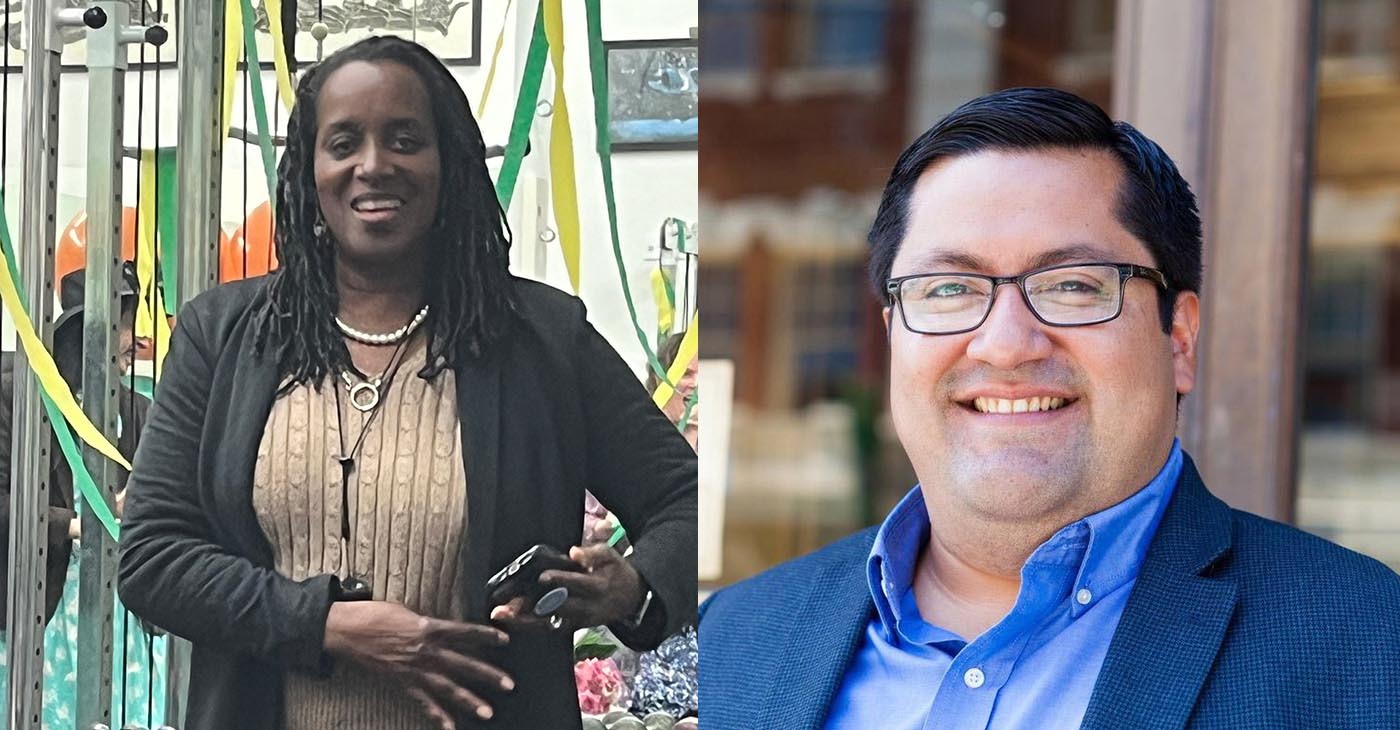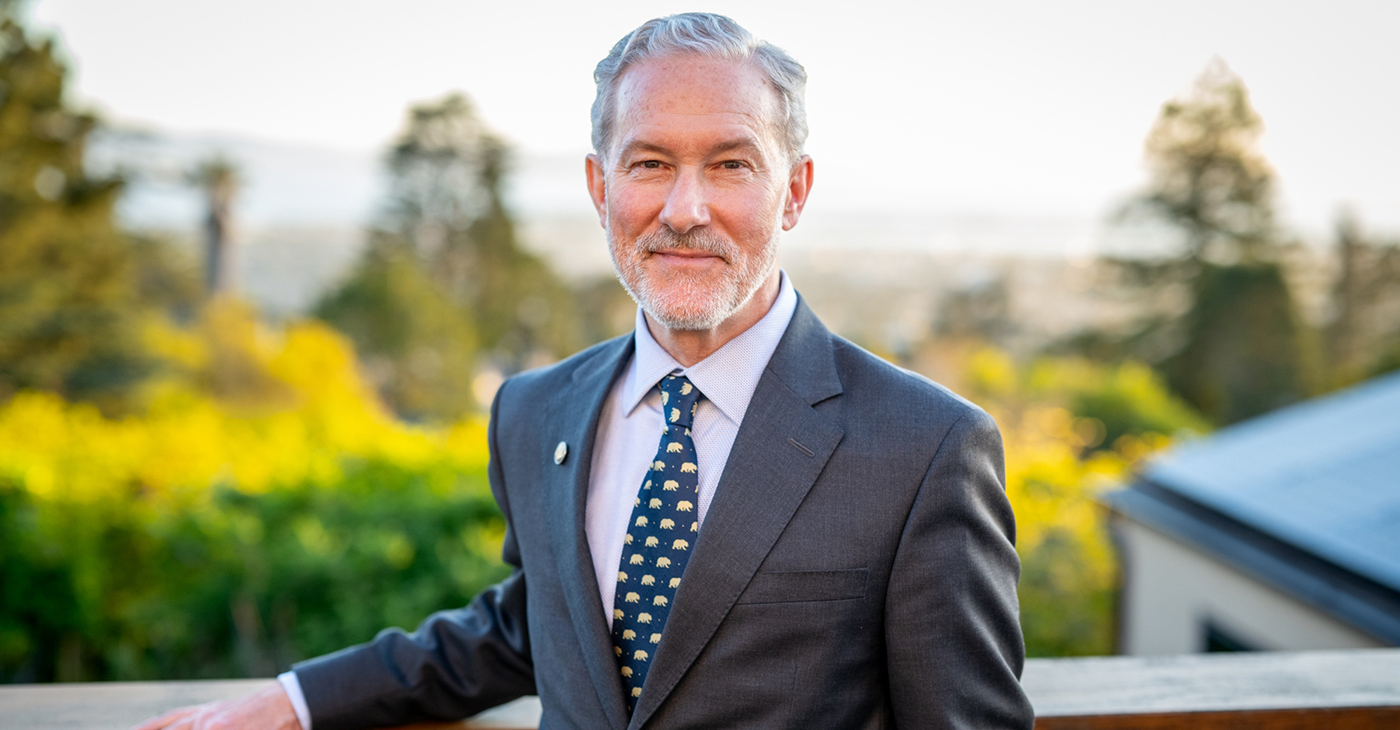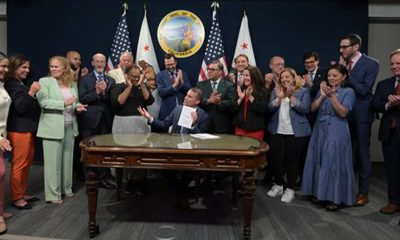Berkeley
Your Taxes, Cash Flow and COVID-19 Crisis: an Interview With BOE Chair Malia Cohen

A little over one year ago, members of the California Board of Equalization (BOE) unanimously selected Malia M. Cohen, former president of the San Francisco Board of Supervisors, to chair the 141-year-old state agency.
Cohen made history when she became the first African-American woman elected to the Board of Equalization in November of 2018. She is also the first Black woman to serve as chair of the Board of Equalization, the agency responsible for administering California’s $70 billion property tax system.
In her role, Cohen represents nearly 10 million constituents residing in 23 counties in Northern and Central California, extending from Del Norte County in the north to Santa Barbara County in the south.
She’s the youngest constitutional officer serving in California.
Our interview with Cohen is one of several we will have with state officials from all backgrounds. What they share with us will help keep African Americans in California up to speed with important news coming out of government that has direct impact on our lives, money, health and civil rights.
Our goal is to help close the information gap that exists between our community and other groups throughout our state.
California Black Media (CBM): The coronavirus pandemic is clearly impacting the economy. Just how bad is it?
Malia Cohen (MC): It’s bad. The pandemic has turned all of our lives upside down. Just this week, the governor announced that over 1.6 million Californians have filed for unemployment because of the pandemic. Many more will file in the weeks to come. State and local governments will lose revenue needed to maintain vital services. It is a true financial crisis.
CBM: How are our elected leaders responding to this financial crisis?
MC: Our African-American elected leaders in California’s Congressional delegation — Sen. Kamala Harris and congresswomen Maxine Waters, Barbara Lee, and Karen Bass — have been working overtime to provide financial assistance. W are fortunate to have our own Congresswoman Maxine Waters serving as chair of the House Financial Services Committee and Congresswoman Karen Bass serving as the chair of the Congressional Legislative Black Caucus. In the coming days, I look forward to working with these remarkable African American leaders to provide direct communication about financial relief for our community. One way will be through telephone town halls and community press communications just like this.
CBM: What can be done to assist persons who are suffering financially as a result of the pandemic?
MC: Action has already been taken to delay the date for filing and payment of income taxes to the IRS and the California Franchise Tax Board. The traditional tax day deadline of April 15 has been extended to July 15. Individual taxpayers seeking information about their own filing requirements can call the IRS at 1-800-829-1040 and businesses can call 1-800-829-4933. For the California Franchise Tax Board, taxpayers can call 1-800-852-5711.
CBM: What help is coming for a person who just needs money to live on?
MC: Congress also approved payments of up to $1,200 for individuals and $2,400 for married couples, and $500 for each qualifying child. These funds will be sent to everyone who filed federal income taxes for either 2018 or 2019, and has an income under $75,000 for individuals and up to $150,000 for married couples. These checks will be reduced by $5 for every $100 above the $75,000 and $150,000 thresholds. Single filers with incomes over $99,000 and $198,000 for couples are not eligible.
CBM: How are the checks going to be distributed?
MC: They are going to be sent out via direct deposit to bank accounts.
CBM: What if the IRS does not have my direct deposit information, or if I have moved?
MC: According the IRS website, “In the coming weeks, Treasury plans to develop a web-based portal for individuals to provide their banking information to the IRS online, so that individuals can receive payments immediately as opposed to checks in the mail.”
CBM: What about folks who usually don’t file tax returns, and can they get a check?
MC: According to the IRS, the website irs.gov/coronavirus is going to publish information about how to file for these coronavirus economic impact checks even if you have not filed a tax return in 2018 or 2019.
CBM: Do you have any other suggestions for persons who need relief?
MC: Yes. Please remember to file for the California Earned Income Tax Credit (EITC) and the Young Child Tax Credit if you or your family are eligible. Here’s how to file. If you have taxable earned income under $30,000, you can file and receive up to $240 if you have no children. If you have one child, the credit could be as high as $1,605. If you have three or more children, the credit rises to $2,982. In California, a taxpayer files Franchise Tax Board Form 3514 California Earned Income Tax Credit along with your state income tax return. To get a copy of Form 3514, go to the Franchise Tax Board website, ftb.ca.gov. Click on “Forms” in the top right of the website. Then, under “Get forms, instructions, and publications” click “Online.” On the next page, where it says “Form Number and/or Keywords” type in 3514. That will take you to the form for filing the California Earned Income Tax Credit.
Also, you may qualify for the federal IRS Earned Income Tax Credit. To qualify, you must file an income tax return with the IRS (Form 1040), and also be within income guidelines. If you have children, you attached “Schedule EIC” to your Form 1040. To get more information, go to the IRS website, irs.gov, click on “Credits and Deductions” at the top of the page. Then click on “Earned Income Credit (EITC).”
CBM: What about financial assistance for small businesses?
MC: Congress just passed a $349 billion paycheck protection program, which provides loans to small businesses to help them keep their workers on payroll. This is one way to help businesses so that they do not have to lay off their employees. Every eligible small business should consider taking advantage of this program.
CBM: Where can people get information about this program?
MC: Go to the website treasury.gov/cares and click on “Assistance for Small Business.”
CBM: What if I run a small business and can’t get together my California Sales Tax filing because of the governor’s stay-at-home order?
MC: Businesses affected by the coronavirus can request relief of interest or penalties or request an extension for filing a return by going to the California Department of Tax and Fee’s website: CDTFA.ca.gov. Go to the “Alert!” banner at the top of the page, and click on “Learn more” after the sentence, “CDTFA is able to make it easier for taxpayers to request relief.” Or, taxpayers can call: 1-800-400-7115.
CBM: Will taxpayers still have to pay their property taxes on April 10th?
MC: The April 10th deadline is fixed in statute. Only San Francisco has extended the deadline to May 4 due to the shelter-in-place order in effect in San Francisco. Local county tax collectors can relieve penalties and interests if they determine that failure to make timely payment is due to reasonable cause and circumstances beyond the taxpayer’s control. Taxpayers would have to file for relief of penalties and interest with their county tax collector. I certainly hope that tax collectors are willing to grant relief to all who are impacted by the coronavirus and the stay-at-home orders.
CBM: How do we contact you if we need help?
MC: We are always eager to help. Call and leave me a message at 415-557-3000 or email me at MaliaCohen@boe.ca.gov and we will get back to you as soon as we can. My website at www.boe.ca.gov/Cohen has many helpful resources or you can follow me on Facebook or sign up for my newsletter to receive updates.
Note: Complex tax laws and concepts were discussed in this interview. It may not address every situation and is not considered written advice. Changes in law or regulations may have occurred since the time this news release was written. If there is a conflict between the text of this news release and the law, decisions will be based upon the law and not this news release.
Activism
In Crowded Race, Jovanka Beckles Wins Spot in November Runoff for State Senate
AC Transit Board Director Jovanka Beckles came in second place in the six-way primary race for state Senate District 7 seat to represent Oakland and Berkeley, placing her in the runoff race in November against Berkeley Mayor Jesse Arreguín to replace Sen. Nancy Skinner, who termed out. Beckles, writing on social media, emphasized that she had won with community support though the leading candidate was way ahead in campaign spending.

By Ken Epstein
AC Transit Board Director Jovanka Beckles came in second place in the six-way primary race for state Senate District 7 seat to represent Oakland and Berkeley, placing her in the runoff race in November against Berkeley Mayor Jesse Arreguín to replace Sen. Nancy Skinner, who termed out.
Beckles, writing on social media, emphasized that she had won with community support though the leading candidate was way ahead in campaign spending.
“Despite being vastly under-fundraised, we have emerged victorious in the State Senate primary! This victory is not just about me. It’s a victory for our working class, our poor, our disenfranchised Black and Brown communities, our Palestinian siblings fighting for liberation.”
In the March 5 primary, Arreguín came in first with 32.81% of the vote, while Beckles received 17.48%. Oakland Councilmember Dan Kalb was third with 14.89%, while Kathryn Lybarger followed with14.46%. Sandré Swanson received13.36%, and Jeanne Solnordal captured 7%.
Born in Panama, Beckles immigrated to the U.S. with her family when she was 9. She attended Florida A&M University on a full-ride basketball scholarship, majoring in psychology as an undergraduate and later earned an MBA.
She worked for decades in public health as a mental health clinician, serving impoverished and marginalized children and families in Contra Costa County.
In a speech at a recent victory celebration, she emphasized her progressive record of working for her East Bay constituents.
“I’m here today because of you, your belief in me, a Black, Latinx, immigrant, gay woman,” she said. “We did something historic. Grassroots candidates don’t (often) beat millions of dollars.”
“When I get to Sacramento, I will continue delivering results for you,” she said, pledging to continue working on tenant protections such as supporting the ballot measure to remove a ban on rent control in California.
Beckles plans to propose expanded legal protections for seniors and disabled tenants; create educational opportunities to make public school and university education fair and available for all students; provide transfers for AC Transit and make public transportation affordable for seniors and people with disabilities; and enhance environmental protections.
She also supports a Gaza cease-fire.
Bay Area
Rich Lyons, Longtime Campus Business, Innovation Leader, Will Be UC Berkeley’s Next Chancellor
Rich Lyons, an established economist, former dean of the Haas School of Business and the campus’s current leader for innovation and entrepreneurship, will become the next chancellor at the University of California, Berkeley, the UC Board of Regents announced on April 10.

By Jason Pohl
Rich Lyons, an established economist, former dean of the Haas School of Business and the campus’s current leader for innovation and entrepreneurship, will become the next chancellor at the University of California, Berkeley, the UC Board of Regents announced on April 10.
The board’s unanimous confirmation makes Lyons, 63, the first UC Berkeley undergraduate alumnus since 1930 to become the campus’s top leader. In an interview this week, Lyons said he credits his Berkeley roots and his campus mentors with encouraging him to ask big questions, advance institutional culture and enhance public education — all priorities of his for the years to come.
Lyons, who will be Berkeley’s 12th chancellor, will succeed Chancellor Carol Christ, who announced last year that she’d step down as chancellor on July 1.
“I am both thrilled and reassured by this excellent choice. In so many ways, Rich embodies Berkeley’s very best attributes, and his dedication to the university’s public mission and values could not be stronger,” Christ said. “I am confident he will bring to the office visionary aspirations for Berkeley’s future that are informed by, and deeply respectful of, our past.”
Rising through the Berkeley ranks
Born in 1961, Lyons grew up in Los Altos in the early days of the Silicon Valley start-up boom.
He attended Berkeley, where he graduated in 1982 with a Bachelor of Science degree in business and finance. Lyons went on to earn his Ph.D. in 1987 in economics from MIT. After six years teaching at Columbia Business School, Lyons returned west, where in 1993 he joined the Berkeley faculty as a professor of economics and finance, specializing in the study of international finance and global exchange rates.
He’s remained on campus since, with one notable exception.
Starting in 2006, Lyons spent two years working at Goldman Sachs as the chief learning officer. It was a period that instilled in him an appreciation for leadership and the importance of organizational culture.
He carried those lessons with him when he returned to campus in 2008 and became the dean of the Haas School of Business.
While dean, Lyons oversaw the construction of Connie & Kevin Chou Hall, a state-of-the-art academic building that opened in 2017 and is celebrated for its sustainability. He also helped establish two new degree programs, linking the business school with both the College of Engineering and the Department of Molecular and Cell Biology.
But it was his creation of four distinct defining leadership principles that spurred a sweeping culture initiative at the school that stands out in the minds of many. Those values — question the status quo, confidence without attitude, students always, and beyond yourself — became a creed of sorts for new students and alumni alike.
Those values are important, Lyons said, because they shape and support the cohesive structure of a strong, connected community — spanning science and technology to the arts and humanities. They also convey the story about what it means to be at Berkeley and to believe in the university’s public mission.
“When we are great as educators, it’s identity-making,” Lyons said. “We’re helping students and others see identities in themselves that they couldn’t see.”
Lyons in January 2020 became Berkeley’s first-ever chief officer of innovation and entrepreneurship.
Building on his research exploring how leaders drive innovation and set behavioral norms and culture, Lyons worked to expand and champion Berkeley’s rich portfolio of innovation and entrepreneurship activities for the benefit of students, faculty, staff, startups and external partners.
It was a major commitment to thinking outside the box, he said. One need only look to the Berkeley Changemaker program that he helped launch in 2020 to see innovation and entrepreneurship in action.
The campuswide program with some 30 courses tells the story of what Berkeley is — the story that members of the Berkeley community can tell long into the future. Berkeley Changemaker started as an idea and its courses quickly became among the most popular academic offerings on campus.
“Over 500 students showed up,” he said. “Why? Because it’s a narrative. It’s not just a name. It’s not just a curriculum. It’s not just a course. It’s a way of living, and it’s a way of living that Berkeley has occupied forever. This idea that there’s got to be a better way to do this, question the status quo.”
Activism
Oakland’s ‘Green the Church,’ Others, Host a Climate Revival
On April 20, Oakland’s Green The Church California (GTC) and the Center For Food, Faith and Justice will celebrate Earth Day and present a Climate Revival event titled “Growing Healthy Communities From Soil To The Soul” at McGee Avenue Baptist Church at 1640 Stuart St, Berkeley, CA. The day will include inspiring talks, interactive workshops, networking opportunities, and a special panel on Food Sovereignty and Global Food Resilience.

Growing Healthy Communities from Soil to the Soul in Berkeley
By Y’Anad Burrell
On April 20, Oakland’s Green The Church California (GTC) and the Center For Food, Faith and Justice will celebrate Earth Day and present a Climate Revival event titled “Growing Healthy Communities From Soil To The Soul” at McGee Avenue Baptist Church at 1640 Stuart St, Berkeley, CA,
The day will include inspiring talks, interactive workshops, networking opportunities, and a special panel on Food Sovereignty and Global Food Resilience.
The keynote speaker is Rev. Danté R. Quick, PhD, senior pastor of First Baptist Church of Lincoln Gardens in Somerset, N.J. Quick is well known in the Bay Area, having served for more than 10 years as pastor of Friendship Missionary Baptist Church in Vallejo, CA.
Green The Church, founded in 2010 by Rev. Dr. Ambrose Carroll, Sr., and headquartered in Oakland, helps galvanize Black churches and their local communities and leaders to address issues critical to populations historically disengaged from conversations around pollution and health, climate change, and sustainability and energy efficiency.
The organization collaborates with major environmental, sustainability, food security, faith, and community-based non-profit organizations, and is committed to “creation justice”—care and justice for God’s people and the planet—and building the Beloved Community.
Environmental justice has long been a pressing concern for communities of color who bear the brunt of pollution and ecological degradation. Climate change exacerbates these issues, disproportionately impacting vulnerable communities. Recognizing this urgency, Black churches across the country are taking action.
With deep roots in the African American community and its commitment to social justice, the Black Church has become an essential advocate for sustainable practices and policies.
Over the past 14 years, in a powerful collaboration with significant environmental, sustainability, food security, faith, and community-based non-profit organizations, GTC has created a cadre of Black churches engaging in the environmental justice, climate, and sustainability movement.
GTC presently works with more than 1,000 pastors and congregations across the U.S., and groups in the Bahamas, Ghana, Nigeria, and the UK, showing that we can make a difference together.
The partnership between environmental justice advocates and the Black Church extends beyond individual congregations. Green The Church provides resources and support for faith communities seeking to address climate change and promote environmental justice.
Through collaboration, initiatives such as energy efficiency programs, solar installations, and environmental education have been implemented in Black churches nationwide. These efforts reduce the carbon footprint and save money on energy bills, benefiting the congregations and their communities.
The involvement of the Black Church in the fight against climate change is not just a participation, it’s a powerful message that galvanizes action across communities.
By integrating environmental justice into their ministry, Black churches are demonstrating that addressing climate change is not only a matter of science but also of social and moral responsibility, inspiring change at a grassroots level.
For more information, go to: www.greenthechurch.org.
-

 Arts and Culture3 weeks ago
Arts and Culture3 weeks agoRooted in Tradition: The Intricate History of Black Hair Braiding
-

 Bay Area4 weeks ago
Bay Area4 weeks ago“I Will Not Be Bullied,” Says Oakland Mayor Sheng Thao
-

 Bay Area2 weeks ago
Bay Area2 weeks agoPG&E Increases Rates While Bay Area Households Are Struggling to Stay Afloat
-

 Business3 weeks ago
Business3 weeks agoGov Newsom: Raising Fast Food Minimum Wage to $20 Pays Off as Jobs Multiply in Industry
-

 Activism4 weeks ago
Activism4 weeks agoOpponents of Mayor Sheng Thao Are Calling on Her to Resign Following FBI Raid
-

 Community1 week ago
Community1 week agoHundreds Come to Jehovah’s Witnesses’ Assembly Hall for Three-Day Program of ‘Good News’ in Fremont
-

 Bay Area2 weeks ago
Bay Area2 weeks agoJuneteenth Mass Shooting Suspect Charge with Multiple Counts of Felony Assault by Alameda County DA Pamela Price
-

 Activism4 weeks ago
Activism4 weeks agoOakland Coliseum Sale to AASEG: A Model for Community Development and Inclusion




















































